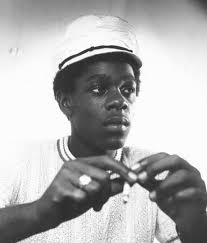By Cecelia Campbell-Livingston—
MUSIC producer Winston ‘Niney’ Holness is determined to revive the fortunes of the reggae singer with his Observer Soundbox studio which officially opens on Tuesday.
Holness says he will scout for singers through twice-weekly auditions at the Lyndhurst Road facility.
   NINEY in the studio NINEY in the studio |
“I love singers. From Bible days, it’s been about musicians and singer, I never hear about any deejays and singjays!” he told the Jamaica Observer.
According to Holness, whether it takes one day or one year, he is willing to invest the time to ensure his quest is successful.
“If I search and search and can’t find what I am looking for, then I will go for the animals and record their sounds in the studio,” he declared.
The Niney auditions are scheduled to take place on Wednesdays and Saturdays from 10:00 am-6:00 pm and is not limited to reggae.
“Gospel, meringue, mento, cha cha, hully gully…You name it. Just come sing!” Holness exclaimed.
While his emphasis is on vocalists, the outspoken Holness stressed that he is not anti-deejay, having worked with performers like Big Youth and Dillinger. He says he may be persuaded to take a chance on toasters, but only if they meet his criteria.
“Those deejays were deejays. I would do it again if the message is right. As long as (there is no) nuh bleach up face an’ under mi thing that brought the music down.”
Now 61, Holness has been involved in the music business for over 40 years and is known for his work with some of reggae’s great singers including Dennis Brown and Ken Boothe.
Though he had a big hit song as a singer in 1971 with Blood and Fire, Holness made a mark as producer with his Observer label during the 1970s.

Boothe’s Silver Words was one of his first big songs as a producer in 1973. That was followed by a flurry of hits from Brown (Westbound Train, Cassandra, No More I Roam, Whip Them Jah, Here I Come), Junior Byles (King of Babylon), Gregory Isaacs (Ba Da) and Sugar Minott (Lover’s Race, No Vacancy).
Born in Montego Bay, Holness got his enduring nickname after losing a finger in an accident. In the late 1960s he worked as an engineer at KG Records. His first release was the self-produced Come On Baby, issued on his Destroyer label.
He moved on to work with producer Bunny Lee, then for Lynford Anderson before joining Joe Gibbs as chief sound engineer, replacing his friend Lee ‘Scratch’ Perry.
After leaving Gibbs, Holness tasted great success as artist/producer with Blood and Fire which was a hit in Britain.
Throughout the 1970s and early 1980s, Holness produced songs by Delroy Wilson, Horace Andy, Max Romeo, The Heptones, Johnny Clarke, Slim Smith, Jacob Miller, Junior Delgado, Freddie McGregor, Big Youth, Dillinger and Third World.
In the mid-1980s, he relocated to New York City. While in the United States, he formed an association with the independent Heartbeat Records from Cambridge, Massachusetts, which reissued much of his extensive catalogue.
Holness believes it is only a matter of time before music coming out of Jamaica will once again hold a prime spot on international charts.
“Just as the seas always reclaim its own, reggae music coming out of Jamaica will come back strong,” he said.


You must log in to post a comment.